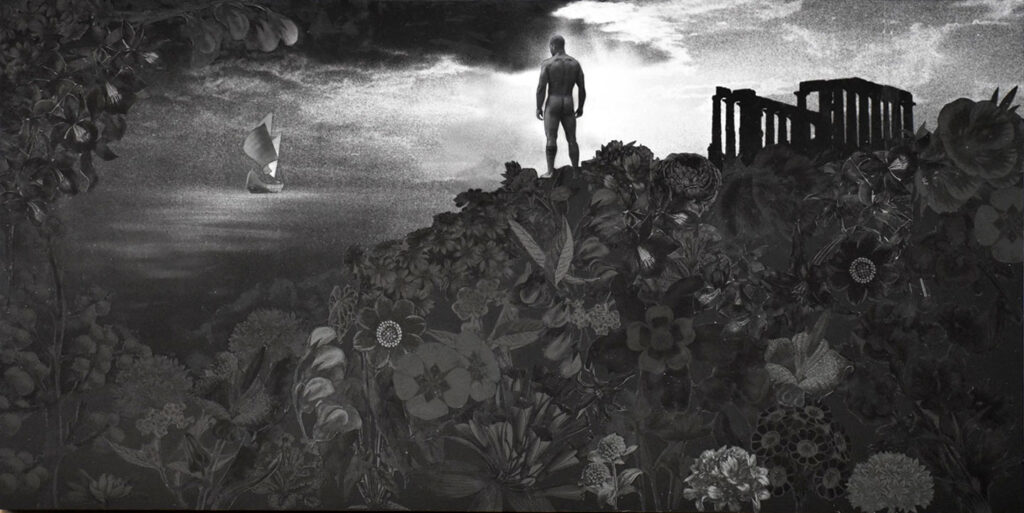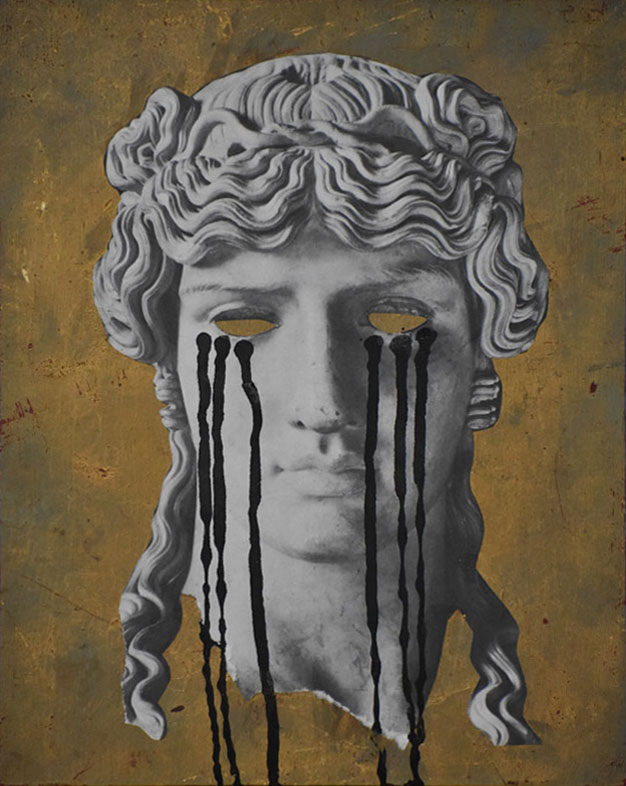Now then, there was a ship by the name of Argo which sailed from Ioclos to Cochis where Jason and the Argonauts travelled to retrieve the Golden Fleece.
It came to pass that on this journey, Heracles and the shy, younger Hylas, who’s hair hung down in curls, became inseparable. And like a father with a dear son, Heracles taught him all the things which had made him a mighty man, and famous. And by keeping the younger man at his side, the older warrior hoped he might attain the true measure of a man. Shoulder to shoulder they manned their ship stations, and when on land, hunted, roasted their prey, sacrificed to the gods and trained for battle.
Now it came about that Heracles’ soul became knit to the soul of Hylas. And Hylas loved him as his own soul and made a covenant with Heracles. And Heracles stripped himself of the tunic that was on him and gave it to Hylas and his armor and even his sword and his bow and belt.
And Hylas went out and was successful wherever Jason the ship captain sent him so that Jason gave him his own regiment on the island of Caprius. And the women came out of the villages singing and dancing with tambourines and lyres and drums and songs of joy and they sang to one another as they celebrated: Jason has struck down his hundreds and Hylas his thousands.
And Jason was angry and this song displeased him. They have ascribed to Hylas thousands, and to me they have ascribed hundreds, and what more can he have but command of my ships? Laertes spoke the truth to him. You are strong and are the great grandson of Hermes but Hylas is stronger, for he has Heracles at his side.
From that day on, Jason mistrusted Hylas. And Heracles saw the talents in Hylas and that he was favored by the gods. And Jason was afraid of him because Heracles was with Hylas but had departed Jason.
With the aid of Heracles, Hylas had more success than all the mortal warriors under Jason’s command, so that his name was highly esteemed.
It came to pass as the Argo rounded Mykonos that the Captain ordered the ship to anchor for the night to abide the coming storm. As the Argo approached the cove, the men furled its sails and laid them in the ship’s hold: they slackened the forestays, lowered the mast into its place, and as they rowed the ship to the place where they would have her lie, Heracles broke his oar against a rock: there they cast out their mooring-stones and made fast the hawsers.
In the long, hot summer afternoon Heracles and Hylas dove into the warm sea and swam to shore in search of a pine tree to carve a new oar.
Heracles, reaching shore first, put together a fire to dry their tunics. When he reached land, Hylas followed the smoke to find his ship mate by the fire. In silence, he removed his tunic and hung it to dry. Knowing Hylas as he knew himself, Heracles could see into his silence. Why are you angry? he asked.
“You swim at lengths ahead of me. In every way you’re stronger,” Hylas replied. “You beat me in battle, you row faster you bring to the altar more from the hunt. By every measure of a man you surpass me.”
“Have I not taught you what I know?” asked Heracles. “Am I not the man who lead you out of Ioclos? You only see what you are lacking. You don’t see that I am with you and not against you.”
But jealousy burned in Hylas and he only saw Heracles as his competitor.
So Heracles set down the strigil and scented oil and bade them to purify themselves for he hoped to distract Hylas from his thoughts.
It came to pass that Hera saw her opportunity and dispatched one of her spies. Determined to make Heracles suffer, she gave Pan a portion of nepenthe and delivered her plan to him.
As the forlorn Hylas wandered into the forest to collect dead wood for the fire, he heard the soft notes of a wooden flute. Following the bewitching melody, he came upon Pan basking in the brindled light by the clear spring. Startled and amazed by the vision - his first sighting of a satyr - he hid behind a thicket of brush. “Don’t be afraid. I knew you were coming,” said Pan. “I have a gift for you.”
“Would you like to have his power?” Pan asked and handed him a hollowed out fennel stalk. “Share the contents equally between you but you cannot tell him of its origins. If you do, its effect will dissolve and the spell broken. But know that once taken, you will have a new destiny.”
Hylas returned to the fire to find Heracles felling the tree for his oar.
In silence, the young Hylas built a small altar from a flat rock and offered a pigeon without blemish and the smoke with the savour of his sacrifice rose curling up towards the heaven.
He prayed to Mars for the potion to work and Mars heard his prayer but knew that it was Aphrodite who must come to his aid. For Mars understood. So often have men come to him in pursuit of strength and military victory, and not accepted what they are truly in search of.
The younger man roasted a small boar from the morning hunt and served it with the nepenthe wrapped in grape leaves and wine from his goatskin. With their fill of wine and meat, Aphrodite caused a deep sleep to fall upon them.
They awoke to the setting sun in a world dusted with gold. The sky, the trees, the plants - everywhere the eye landed was more pleasant to the sight. As if Athena had painted the island with her brush. And when Hylas looked up at Heracles’ silhouette against the crimson sky he wept for he had never seen anything more beautiful. And Heracles turned to him and spoke: It is you who makes me weak, Hylas. And the younger man formed a fist and touched Heracles’ bearded cheek with the back of his hand; Pan had spoken the truth.
Now it happened that Hylas heard Pan’s flute and the distant sound of drums’ ancient rhythms. Notes filled the night from instruments their ears had never heard.
Pan threw a handful of gold dust in the air and blew a deep breath converting them into insects glowing with fire. The men crushed the flies in their fingers and applied the glow to their faces in the war paint pattern Heracles had shared before the battle of Thermopylae.
Taking Hylas by the hand, Heracles’ followed the traces of lightning into the forest. And when they reached the top of the hill there was a large gathering below and happiness drenched them and Heracles whispered: We are with the gods.
They made their way down and their hearts pounded faster and the drums beat louder. And that night - that seemed to last forever - they danced with Poseidon who kissed Heracles and let Hylas hold his trident. And Hylas knew no jealousy for nepenthe takes away all pain.
And it happened that Hylas took Heracles in his arms and kissed him and filled him with a joy he had never known. And after dancing under the moon with the gods, they returned to their camp and Heracles yielded to him. As Pan had promised, Hylas had Heracles’ power.
As the night melted into dawn, Poseidon returned to his sea, washing the last luminescence from their beards with a kiss, taking with him the eternal memory of the gods who've seen it all for so many summers. They'll come and play and dance with you, seduce your hearts and loins but you can never keep them. Because gods always return home. And with Apollo's rising sun, remind you in their jealous beauty that you're just a mortal and you'll never be that young again.
And Hylas never would.
Now then, the day broke and they woke from this dream and the earth returned to its mortal state. And while the strongest man on earth lay sleeping, Hylas hiked to the spring to fill their goatskins to prepare for the day’s hunt. And in his joy, as he came upon the spring, he prayed to Zeus. “Thank you father Zeus for making me to lie down in green pastures, to leadeth me beside the still waters.”
Removing his necklace, he dipped his head into the water to wash. The nymphs of the spring saw his comely face, happy from the long night. Unable to resist his sparkling love filled eyes, they pulled him down, keeping him for themselves, for eternity.
For days, Heracles searched in vain and when it came time for the Argo to set sail he could not leave the island without Hylas. All alone, he went to the edge of the cliff plummeting into the graying sea, weeping and looking out upon the boundless waste of waters.
So he watched as the great ship receded into a memory, mourning the loss of his fellow warriors but mostly for Hylas for now he was alone in the world, unable to return without his beloved.
And he spoke these words.
I am distressed for you, my brother Hylas;
very pleasant have you been to me;
your love to me was extraordinary,
surpassing the love of women.
“How the mighty have fallen, and the weapons of war perished!”
He raised his hands in prayer to his immortal father, “Father”, he cried, “you sired me, doomed to live with so many hardships and challenges. And now I’ve been robbed of my comfort.”
Refusing to abandon his search, many moons wax and waned before he discovered the lion’s claw necklace hanging from the myrtle branch.
Diving into the clear spring, he hoped to recover the young man’s body but found nothing. Never again would he see Hylas. Upon emerging, he wrapped the necklace around his hand in grief until the claw pierced his palm and bled. And feeling the pain in his hand, he knew in that moment this was the work of Hera.
It would be 13 months of mourning before Heracles could leave their camp and begin to live again.

